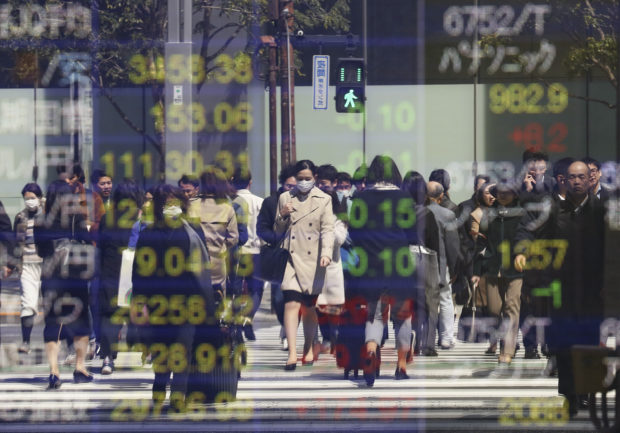
People are reflected on the electronic board of a securities firm in Tokyo, Tuesday, April 2, 2019. Asian stock prices followed Wall Street higher on Tuesday on encouraging global economic data. (AP Photo/Koji Sasahara)
BEIJING – Global stock prices followed Wall Street higher Tuesday on encouraging economic data despite uncertainty over Britain’s departure from the European Union.
Benchmarks in London, Frankfurt, Shanghai and Hong Kong gained while Tokyo was flat. Oil prices rose again, adding to Monday’s big gains.
Investors were encouraged by unexpectedly strong manufacturing data from China and the United States. A separate report showed U.S. construction spending increased in February.
In another hopeful sign, long-term bond yields rose above their recent lows, following a sharp drop last month that flashed a possible recession warning, rattling Wall Street.
The Shanghai Composite index rose 0.2% to 3,176.82 points and Hong Kong’s Hang Seng gained 0.2% to 29,624.67. Tokyo’s Nikkei 225 was flat at 21,505.31 and Seoul’s Kospi advanced 0.4% to 2,177.18.
Sydney’s S&P-ASX 200 added 0.4% to 6,242.40 and India’s Sensex was 0.3% higher at 39,005.70. Benchmarks in Taiwan, New Zealand and Southeast Asia also rose.
On Wall Street, futures for the benchmark Standard & Poor’s 500 index and the Dow Jones Industrial Average rose 0.1 percent.
The S&P gained Monday for a third day, advancing 1.2% to 2,867.19 while the Dow jumped 1.3% to 26,258.42. The Nasdaq composite climbed 1.3% to 7,828.91.
Financial and technology companies powered the latest rally. Investors tend to favor those sectors when they’re confident the economy will grow. Bank of America gained 3.4% and Intel rose 1.5%.
Consumer products makers and utility companies, considered safe-play investments, lagged the market. Clorox fell 1.2% and NRG Energy slid 1.7%.
The yield on the 10-year U.S. Treasury note rose sharply to 2.47% from 2.41% on Friday. It also rose back above the yield on the three-month Treasury bill.
That reverses an inversion in yields that alarmed investors last month. Such a change has preceded recessions in the past.
AUSTRALIAN RATES: Australia’s central bank left rates unchanged but adopted new language, suggesting the bank might be shifting toward a bias in favor of easing policy. The Reserve Bank of Australia said it would “monitor developments” and set policy “to support sustainable growth.” That provides “flexibility to cut” in response to changes in jobs data, said Chris Weston of Pepperstone in a report.
ENERGY: Benchmark U.S. crude gained 8 cents to $61.67 per barrel in electronic trading on the New York Mercantile Exchange. The contract surged $1.45 on Monday to close at $61.59. Brent crude, used to price international oils, rose 4 cents to $69.05 per barrel in London. It jumped $1.43 to $69.01 the previous session.
CURRENCY: The dollar edged up to 111.36 yen from 111.35 yen. The euro declined to $1.1201 from $1.1213. /gsg